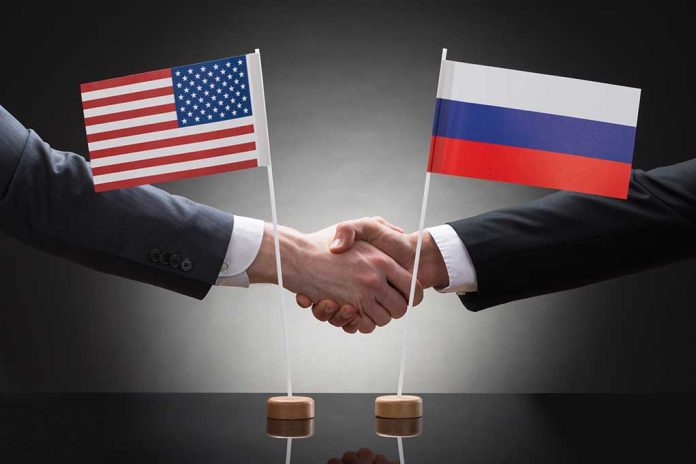
US and Russian officials are set to meet in Saudi Arabia for talks on ending the Ukraine war, but Ukraine itself has been left out of the discussions.
Key Takeaways
- US-Russia talks on Ukraine are scheduled in Saudi Arabia, without Ukrainian participation.
- President Trump recently ended a three-year freeze on direct US-Russia contact with a call to Putin.
- European leaders are not invited to the discussions and will meet separately in Paris.
- Ukrainian President Zelensky insists on Ukraine’s involvement in any peace negotiations.
- The talks signal a potential shift in US approach to the Ukraine conflict.
Diplomatic Shift: US and Russia to Meet Without Ukraine
In a surprising turn of events, the United States and Russia are set to engage in high-level talks aimed at resolving the ongoing conflict in Ukraine. However, the absence of Ukrainian representatives at these discussions has raised eyebrows and concerns. White House Middle East envoy Steve Witkoff is heading to Saudi Arabia for these crucial US-Russia talks, alongside Secretary of State Marco Rubio and National Security Advisor Mike Waltz.
President Donald Trump recently broke a three-year impasse in direct US-Russia communications with a lengthy phone call to Russian President Vladimir Putin. Trump described the conversation as lasting “for a very extended period, like about three hours,” signaling a renewed push for diplomatic engagement. This move marks a significant shift in the US approach to the Ukraine crisis, potentially altering the dynamics of international efforts to end the conflict.
Russian President Vladimir Putin has recently sent his foreign minister, Sergey Lavrov, to Saudi Arabia for important discussions. This visit comes at a time when tensions between Russia and the United States are on the rise. The meeting is significant…https://t.co/hgKTiCeq1O
— USNewsper (@USNewsper) February 17, 2025
Ukraine’s Exclusion and European Concerns
The decision to exclude Ukraine from these talks has not gone unnoticed. Ukrainian President Volodymyr Zelensky has been vocal about his country’s stance, stating emphatically that Ukraine will “never accept any decisions between the United States and Russia about Ukraine, never.” This exclusion raises questions about the effectiveness and legitimacy of any potential agreements reached without Ukraine’s direct involvement.
Adding to the complexity, European leaders have also been left out of these US-Russia discussions. Instead, they will convene in Paris for a separate meeting. French President Emmanuel Macron is set to host an informal gathering focused on Ukraine and European security, with attendees including UK’s Keir Starmer and Germany’s Olaf Scholz. This parallel meeting underscores the multifaceted nature of the diplomatic efforts surrounding the Ukraine crisis.
Shifting US Stance and Its Implications
The Trump administration’s approach to the Ukraine conflict appears to be evolving. President Trump’s administration has suggested that Ukraine’s NATO membership is impractical and that a return to pre-2014 borders is unlikely. This stance has caused concern among European allies, who fear potential US concessions to Russia. US Defense Secretary has echoed Trump’s position, further fueling these apprehensions.
US Vice-President JD Vance has urged European nations to increase their defense contributions, while Zelensky has called for the formation of a European army, citing that reliance on Washington is no longer viable. These developments suggest a potential realignment of transatlantic security arrangements and highlight the complex interplay between US policy, European security, and the ongoing conflict in Ukraine.
The Road Ahead
As US officials prepare for talks in Saudi Arabia, the international community watches closely. The exclusion of Ukraine and European allies from these discussions raises questions about the potential outcomes and their long-term implications for regional stability. While the US seeks to accelerate efforts to end the war, the path to a resolution remains fraught with challenges.
The coming days will be crucial in determining whether these talks can pave the way for meaningful progress or if they will further complicate an already intricate diplomatic landscape. As the world awaits the outcome of these discussions, the future of Ukraine and the broader geopolitical balance in Europe hang in the balance.









